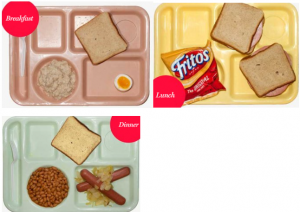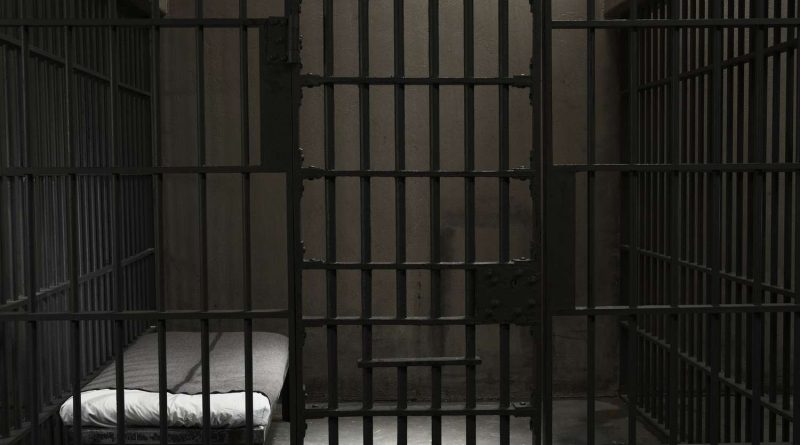Incarceration Vs Innutrition: The Lack of Nutritious Food in Prisons
Saumya Sinha
Staff Writter
Imagine someone stole your human rights, dignity, rights for basic survival, and you are not shown basic social justice and equity. This is the tragic reality of prison inmates across the US when they are deprived of basic nutritious food.
In prisons across the United States, inmates are facing inhumane conditions including, small portions, unappetizing food lacking nutritional value, and limited dietary options. About 62 percent of prisoners say they “rarely/never” had access to fresh vegetables, and nearly 55 percent said the same regarding fruit. And even when fresh food is provided, it’s typically low quality. All of these issues are having a significant impact on prisoners’ mental health and wellbeing.
Proper nutrition is what keeps people healthy in every aspect of their lives. Food provides essential vitamins and nutrients one needs to function daily. If one cannot receive these basic nutrients, everything else falls like a domino in their life. It brings down one’s energy, affecting productivity in everything they are supposed to do. It increases the chances of contracting diseases and chronic illnesses, damaging one’s quality of life. All these effects also contribute to poor mental health and well-being.
Human rights lawyers have been more focused on this topic lately and shocking things have been revealed from their studies. It is impressive how society is kept ignorant and left in bliss by avoiding the inhumane activities happening in prisons. Prisoners are incarcerated for their wrongdoings, for their mistakes in life. But that does not mean they should not have the right to basic nutritious food to sustain themselves. That does not justify the injustice they face while they repent their mistakes.
Gordon County Jail, Calhoun
Inmates of Gordon County Jail, Calhoun were interviewed by human rights lawyers, and eye-opening revelations were made. The inmates reported being fed two meals a day that would be spaced at least 10-15 hours in between. The recommended calorie intake according to the food contract is 2,400-2,800 a day for men, and 1,800-2,000 for women. However, the prisoners were found licking syrup packets and consuming a surprising and unhealthy amount of water to cope with hunger pains. Many suffered extreme weight loss due to these circumstances.
Morgan County Jail, Alabama
In 2009, Sheriff Greg Barlett of Morgan County, Alabama was sentenced to jail after being caught depositing over $200,000 in his personal bank account when the money was initially allocated by the state for providing better food in prisons. Inmates claimed that they were starving and not provided with enough food. Court records outline a “typical meal” under Sheriff Greg Barlett’s jurisdiction, and they include: Breakfast was half of a boiled egg, a dry slice of bread, and a small serving of unsweetened oatmeal. Lunch was two sandwiches with a dab of peanut butter and a small bag of corn chips. Dinner looked like two hotdogs with onion, a dry piece of bread, and a little bit of mixed beans.

Various prisons have been reported for serving inadequate amounts of food that are hard to survive and even barely sustained. Inmates have commented on eating toothpaste and toilet paper to resolve their hunger aches. There have been other prisoners that complained about receiving meals “not even enough for a 5-year-old”.
These unfortunate circumstances are leading to more violence in prisons as well. Inmates have provided testimony on being provided unhealthy processed food that is high in salt, sugar, and carbohydrates increasing the chances of diabetes and other dangerous health issues.
In some other instinces, there was a case of a Hindu inmate in ICE detention being–fed food when he went on a hunger strike. He was protesting about the prison not being able to provide vegan options for people who do not wish to disobey their religion. In another incident, a woman 17 weeks pregnant reported having excruciating hunger pains because of insufficient food in prison. She had requested more snacks or food to help ease her aches but in vain, but was denied.
Ahlman v Barnes
Ahlman v Barnes is a 2020 case filed by the American Civil Liberties Union on behalf of inmates detained in Orange County Jail. It was a case conducted during the Covid-19 pandemic for the availability of covid testing and adjacent facilities, but the inmates had raised concerns about the reduction of “hot meals”. The prison had started to serve cold food for alleged health reasons, but the meals mostly included sack lunches and cold and molded bologna sandwiches which were inedible. ACLU was successful in raising this issue and making it important for “hot meals” to be reinstated.
There have been improvements under the category of food in prison, but it is not enough yet. Food justice will remain incomplete if these already deprived sections of society remain ignored. There have been efforts made in California to increase the number of California-grown fruits and vegetables to be used in prisons. There have been chefs assigned to some prisons to curate a proper meal plan according to their resources. There is an incentive program in New Jersey that allows the inmates to order 40 pounds of outside food on a timely basis. This not only improves the lack of nutrition, but it also elevates the mood of prisoners and motivates them to do tasks and maintain a positive environment, hence reducing civil violence.
Violating the prisoner’s inherent dignity and disrespecting their rights is not justified. Every human being, despite their legal status, should not be denied sufficient nutritious food, because it is a basic requirement for survival. Being incarcerated does not justify being treated unfairly. Being a prisoner is the punishment, not the insufficient unhealthy food, and therefore it should be removed. It contributes to health issues and undermines any effort towards rehabilitation by creating civil issues of violence and unrest. People should focus on the unfair system. Innovative strategies need to be drawn up for this issue to be a conversation of the past.
The urgency of addressing the deplorable state of nutrition in prisons cannot be overstated. When individuals are deprived of basic sustenance, their very humanity is violated, stripping them of dignity and perpetuating cycles of suffering and injustice.
The testimonies from inmates across various prisons paint a stark picture of neglect and maltreatment. From enduring hunger pains to resorting to eating toothpaste, the harrowing realities of inadequate food provisions demand immediate action. The case of Sheriff Greg Barlett underscores the egregious misuse of funds meant to alleviate such suffering, highlighting the systemic failures that perpetuate this injustice. While efforts have been made to improve food quality in some prisons, such as initiatives in California and New Jersey, they fall short of addressing the systemic issues at play. Food justice remains incomplete as long as marginalized populations, including incarcerated individuals, continue to be disregarded.
It is incumbent upon us to recognize that every human being, regardless of their legal status, deserves access to nutritious food as a basic human right. The current system not only perpetuates physical and mental health issues but also undermines the potential for rehabilitation, perpetuating cycles of violence and unrest.
To truly address this issue, innovative strategies must be developed to overhaul the existing system and prioritize the well-being of all individuals. By doing so, we can pave the way for a more equitable and just society, where the dignity and rights of every individual are upheld and respected.
Contact Saumya at sinhasau@shu.edu.

